Golden Moments in the Life of America’s Oldest Hunter
At 105-years old, Clyde Roberts returns to the woods year after year for a shot at just one more buck

Editor’s Note: Clyde Roberts, the oldest deer hunter in America, died September 10, 2019. He was 105. Last year, I was fortunate enough to hunt with him on land he had lived and worked on his whole life. Clyde could still climb a 20-foot ladder to a tree stand, sit stone still, and drop a deer at 100 yards. When I asked him the secret to his longevity, he said, “Hard work and living for the Lord.” Occasionally, you meet someone and sense almost instantly that he is a person of absolute integrity. Clyde Roberts was such a man. —Bill Heavey
At 105, Clyde Roberts no longer stacks them up like he did at 100, when he took three whitetail bucks and two does in a single season. He still lives in the same house he’s been in for 70 years, still drives himself to church on Sunday, still mows and rakes his front yard. But he no longer hunts alone or climbs a 24-foot extension ladder up to his treestand. His son, Mike, 68, built him a sturdier perch a few years ago, one with wooden stairs and a handrail, and either Mike or Mike’s daughter, Christin, 45, now accompanies Clyde afield. But the oldest hunter in America still feels the pull of November in his blood, still feels the old urgency.
“I asked the good Lord to let me live till 105 and get one more buck,” he tells me. “But if it’s over tomorrow, I’m satisfied.” At this, Mike rolls his eyes. “Dad carries on that way every year,” he says. “To be honest with you, I’ve lost track of how many ‘one more’ bucks he’s killed.”
When I meet Clyde at his house in tiny Evington, Virginia, I’m not sure what to expect. His gaze is direct, his handshake firm. You’re tempted to think that he doesn’t look his age. But then you realize that you have no idea what 105 looks like. There just aren’t many such men around. There are no other such hunters, as far as anyone knows. For years now, local newspapers have run short articles featuring a photo of Clyde and a caption calling him “North America’s oldest hunter.” So far no one has stepped forward to dispute that claim.
Clyde can only hear you if you talk loudly, the result of working in a sawmill as a young man and of having brain surgery for a benign tumor near his ear a few years ago. “Doctor at the time said I’d lose my hearing and my balance too,” he says with a smile. That didn’t happen. “Another told me he didn’t want me hunting from treestands anymore.” He smiles again. That didn’t happen either.
His drawl is distinctive, captivating, like a sepia-tone photograph from a Civil War documentary come to life. If you have an ear for the almost endless variations in regional Southern accents, you quickly realize that Clyde’s is very particular, what linguists call the Virginia Piedmont accent, peculiar to people raised in the area south of Charlottesville, west of Richmond, and east of the Blue Ridge. (While the city of Roanoke falls within those boundaries, its people have an altogether different accent.) In Clyde’s mouth, “help” becomes “hep,” “four” becomes “fo-ah,” and “bear” becomes “bay-uh.”

Field & Stream/Clyde 105 yr old hunter.
We’re sitting in the den, its cream-colored walls covered with deer mounts, family photographs, and a letter from the Commonwealth of Virginia congratulating him on “being an inspiration” to the state’s hunters on his 100th birthday. Soon Clyde is telling me about the days before the telephone, when people wanting to converse with their neighbors “hollered” from farm to farm. One time, his aunt, sounding more than a little vexed, hollered that Clyde’s dog had just gotten into the milk she’d placed in the spring to cool. “I yelled back, ‘Don’t worry, Auntie. That milk ain’t gonna hurt that dog,’” he says. “She straightened me out pretty quick.”
A couple of hours pass quickly, and it’s time to head out for our first afternoon’s hunt. Mike has to work but will drive us to the stand. His daughter, Christin, has arrived to hunt with her “Pawpaw,” with whom she shares a birthday. An only child, Christin grew up hunting, fishing, and trapping with Mike and Clyde. She jokes that she’s her dad’s only son. I follow as Clyde disappears down the basement stairs to dress. He points to wooden shelves full of jars of the last fruits and vegetables that his wife, Nadine, put up from the garden they used to keep out back. Nadine has been gone 15 years now. “I never opened them,” he says. “Probably no good anymore.” He doesn’t need to say that he can’t bring himself to throw them away.
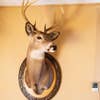
Field & Stream/Clyde 105 yr old hunter.
He tells me how the two of them would butcher deer and Nadine would put the meat up. “She didn’t let nothing go to waste.” Clyde sits on the sagging couch, puts his feet into his boots, and ties the laces. He declines my arm in getting up from the couch.
We pile into the truck, and Mike drives us all of a quarter-mile from the house and parks 40 yards from the treestand. I carry Clyde’s CVA Accura V2 muzzleloader. Clyde carries a walking stick in one hand and slips the other into the crook of Christin’s arm for support. The land around us has the gentle, natural contours of earth that has never been sculpted by modern machinery. The grass is impossibly green.
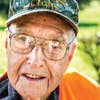
Field & Stream/Clyde 105 yr old hunter.
In His Day
Clyde has been on this ground all his life. He tilled it barefoot behind the family’s one horse before he turned 10. His family—all seven of them, including an older brother and three sisters—lived right here in a four-room house, two rooms up and two down. The house burned long ago, just like the one they built to replace it. No one had any kind of insurance in those days. The family’s sole source of water and refrigeration was the spring at the bottom of the wooded ravine off to our left. The water source is no bigger than the hood of a car; the family joke was that children were told to fill their buckets from its north end, since that’s where the water in any impoundment is coldest.
When Clyde’s father butchered hogs each fall, Clyde would save the bladders. He’d clean them, insert a straw to blow them full of air, then seal and dry them. Come Christmas Day, he’d get them out and stomp on them just to hear them pop. “That’s what we did for fun then,” he says. I try to imagine a child today toiling for hours in preparation and then waiting weeks for one moment of pleasure.
In grade school, Clyde had a couple of good hounds and a secondhand sawed-off shotgun that he used to hunt rabbits. A man who sold game meat in Lynchburg gave him 10 cents for each one, as long as a hind foot was left on so people would know they weren’t buying a cat. Clyde fished too, but more for food than fun. “We’d tie some braided line to an alder branch and add a little hook to catch horny-heads and those little stone catfish. And we’d eat everything we caught,” he says. Once he finished the seventh grade and started working 10-hour days, he didn’t have time to hunt or fish until he retired at age 65. He reckons the $5 lifetime license he bought in the ’70s was the best money he ever spent.
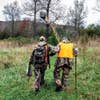
Field & Stream/Clyde 105 yr old hunter.
Rooting Interest
At the stand’s wooden stairs, Clyde stops and announces, “I’m not going up fast,” just in case we were wondering, or worried. Leading with his left foot, he mounts the 20 steps with Christin close behind. I tie the muzzleloader to the tote rope and follow. Clyde hunts the regular firearms season too, but he especially likes the early muzzleloader hunt, before the deer have gotten too wary.
We squeeze in on both sides of him on a narrow bench. Clyde says nothing but can’t keep his face from betraying a certain amount of irritation at having two of us crowding his hunt. He puts the gun’s fore-end on the rail and the butt in his lap. And then he doesn’t move for an hour.
The day is in the mid-50s and overcast. The deer don’t seem to be moving. Too warm, I’m thinking. But then, after 90 minutes, Christin’s body tenses, and she taps Clyde’s arm and points. A doe is working its way down one edge of the woods toward us, just 60 or 70 yards away. I watch, thinking that it’s all about to come together. It’s November 6, prime time. We’ve got a live doe decoy. If there’s a buck around, this should bring him in. But this is deer hunting, meaning none of it amounts to anything until a buck appears. And none do. At last, with the doe still munching away, the light starts to bleed from the sky. Clyde removes the primer from his muzzleloader and passes me the gun. I tie it to the rope. One by one, we descend the steps in the evaporating light and silence, determined not to be disappointed. Only a few thin bushes screen us from the doe, yet she doesn’t spook as the three of us make our way to the truck.
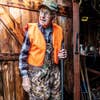
Field & Stream/Clyde 105 yr old hunter.
Back at the house, I find myself cross-legged on the floor of the den, sitting close to Clyde, the better to hear him. The mind at 105 is not a particularly linear thing. Clyde’s reminiscences are organized by some principle known only to himself.
He tells me about his first full-time job, peeling the bark off pulpwood logs for a Mr. Harve Nichols. This was done with a “spud,” a rounded, sharpened tool made from the leaf spring of a truck. It was hard, dirty work, he remembers—10 hours from dawn to dusk for 75 cents a day. “After two days, you’d take your clothes off and they’d stand up on their own from the sap.” He was 13. Later, he spent years working for his future father-in-law, Albert Hensley. He cut timber, snaked it out of the woods, and turned logs at the sawmill.
Mike has since come back and, hearing his father’s recollections, goes outside and returns with the ancient two-man crosscut saw his father pulled back then. At 5 feet 6 inches, it often wasn’t long enough for the old-growth trees that were common at that time—huge poplar, sycamore, and oak. “Sometimes there wasn’t 6 inches on either side of the cut. Then you’d need two men on each handle to work the saw.” I try to wrap my head around this, forests of centuries-old trees and men felling them with hand tools. He worked that job 60 hours a week for $6. I say that he must have been strong to pull a saw for 10 hours a day. “Sure I was strong,” he says, almost irritated, as if I’ve pointed out something so obvious that it doesn’t bear noticing. “You had to be back then.”
We make plans to hunt the next afternoon, and driving back to my hotel, I’m surprised at just how desperately I’m pulling for Clyde to get one more buck. A man his age becomes a kind of communal property. Maybe because we see our own fathers and grandfathers in him. Or we see what we hope for ourselves. I don’t know, but I sure feel it.

Field & Stream/Clyde 105 yr old hunter.
Redemption Time
The next afternoon, Clyde’s outlook is not particularly chipper. He reckons he’ll go out but thinks maybe his hunting days are over. He says he doesn’t really like deer meat. Mike looks dismayed. “He likes it just fine—been eating it all his life,” he tells me. In the half-hour before we go, Clyde relays more memories.
He recalls staying with his aunt as a boy so she wouldn’t be alone when his uncle went to town on business. “Big log house with shake-shingle roofing,” he says. “But with gaps in it. At night, you’d lay in bed and see the stars. Come mornin’ there’d be snow on the covers and on the floor.”
He recounts how a neighbor once asked his father if Clyde could help with his spring planting of corn. It was a cold day in March, and Clyde plowed all day. Toward evening, it started to snow. “And I don’t have a jacket or shoes or gloves. I was barefooted and thought I was going to freeze. And when I was done, the neighbor said, ‘I sho do appreciate you helping me today.’ That was what I got, a thank-you. But people back then would help one another. They helped me build this house. It’s not like that anymore. If something needs to be done and you can’t do it, you’re hurtin’.”
Read Next: 10 Outdoor Legends Share Their Greatest Hunting and Fishing Skills
We drive back to the stand and climb the steps again. And again, Clyde sits and doesn’t move. He reminds me of some ancient oak to which the comings and goings of men are trivial, a passing amusement. Today is a little cooler and breezier than yesterday. No one says anything, but all three of us are hoping for a chance at a shooter buck. A little over an hour in, Mike spots a deer crossing the field. “It’s got a huge rack, Daddy!” he whispers. The buck disappears behind some brush. When it finally re-emerges, it’s not as big as Mike thought at first, but he tells his father to shoot. When Clyde hesitates, Mike says, “Now, Daddy! Shoot!” Clyde does. When the smoke clears, the deer has moved and now stares right at the stand, untouched. Mike tries to reload the muzzleloader. The deer watches for a bit and then ghosts into the woods before Mike can finish. Clyde looks dejected. “Rushed that shot,” he says to me. He shakes his head in disgust. “I knew I didn’t have him. At least I missed clean.” We sit in silence, absorbing what has happened. I can’t tell how Clyde is taking it. I suspect not well. I know it would throw me, especially with two witnesses and all their expectations hovering.
Half an hour later, Mike elbows his dad. A bigger 8-pointer is feeding near where the doe was yesterday. With the fore-end of his muzzleloader resting on the front rail of the blind, Clyde leans forward, puts the scope’s crosshairs on the buck’s shoulder 70 yards away, and fires. The buck drops in its tracks. Mike claps his father on the back.
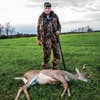
Field & Stream/Clyde 105 yr old hunter.
“You got him, Daddy!”
I touch Clyde’s shoulder and add my congratulations. “Heck of a shot, Mr. Roberts.” Clyde is smiling now. We gather our gear and descend. Mike and I drag the deer toward the truck. It won’t make the record books, but there won’t be an older hunter in North America who tags a bigger buck this year.
Clyde poses as Mike snaps pictures. He’s more animated than I’ve seen him since I arrived. The seasons have wheeled around again. He has taken another buck. Clyde Roberts is undeniably alive. Standing just outside the frame, I ask how he feels now. He smiles. “I feel better,” he says. As we’re unloading the deer back at the house, I hear someone shout, “Way to go, Clyde!” and look up to see a pickup disappearing in the distance. Clyde’s hand is still raised in greeting and he’s smiling. Everybody pulls for him around these parts. Mike peels the backstraps from the deer, and later we celebrate with a meal of chicken-fried venison steak. Clyde’s prayer is answered—for now.
A week later, Mike sends me a photo of a bigger 8-pointer that his dad took with a centerfire rifle. Chalk up another “one more” buck.